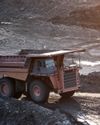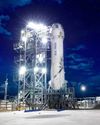In April 2017, the concentration of carbon dioxide in the atmosphere went over 410 parts per million. These suggests that the last time atmospheric CO2 was over 400 ppm was at least as far back as the Pliocene, three to five million years ago, before humans roamed the earth and when the climate was considerably warmer than today.

If we have put too much carbon dioxide into the air, wouldn’t it make sense to simply remove it? Well, yes: it would. Sadly, it’s a costly affair, and doing it on a large enough scale to make a real difference would be arduous. To turn it into a viable technology, we need two things: time, and plenty of money. Billionaire philanthropist and Microsoft co-founder Bill Gates has taken it as a personal challenge.
Carbon Engineering (CE), a company owned in part by Bill Gates, has constructed a prototype plant, installed large fans, and has been extracting around one tonne of pure CO2 every day for a year. Recently, CE passed a major milestone, when it directly began synthesizing a mixture of petrol and diesel, using only CO2 captured from the air and hydrogen split from water with clean electricity. This carbon-neutral, synthetic petrol and diesel will fuel today’s cars, trucks, ships and planes.
The technology may not sound new, but it would be groundbreaking. In the past, synthetic fuels have been made from CO2 and H2, but on a much smaller scale. Carbon Engineering’s pilot plant is the first instance of Air to Fuels where all the equipment has large-scale industrial precedent. It gives a real indication of commercial performance and viability.
A High-stakes Gamble
Governments have argued that the world’s primary concern shouldn’t be to capture excess CO2, but to make less emissions. In the journal Science, Professor Kevin Anderson, deputy director of the Tyndall Center for Climate Change Research, and Glen Peters research director at the Center for International Climate Research (Cicero) in Norway, argue that technologies to remove excess carbon from the planet may not work at scale.
この記事は Industry Leaders の March 2018 版に掲載されています。
7 日間の Magzter GOLD 無料トライアルを開始して、何千もの厳選されたプレミアム ストーリー、9,000 以上の雑誌や新聞にアクセスしてください。
すでに購読者です ? サインイン
この記事は Industry Leaders の March 2018 版に掲載されています。
7 日間の Magzter GOLD 無料トライアルを開始して、何千もの厳選されたプレミアム ストーリー、9,000 以上の雑誌や新聞にアクセスしてください。
すでに購読者です? サインイン

Architects Pick Their Favorite Building Material
Henry Ford, the father of assembly-line manufacturing, had a saying: “Any customer can have a car painted any color that he wants so long as it is black.”

POWERFUL WOMEN IN FINANCE
The coronavirus is not only a public health crisis of magnitude – it’s also a looming reshuffle of the global economic order. Leading through the pandemic and economic crisis is not a minor accomplishment, but the events of this past year haven’t stopped the 10 trailblazers who make up Industry Leaders’ Most Powerful Women in Finance list.

GERMANY ADOPTS NEW LAW TO HASTEN THE END OF COAL PLANTS
A new climate law adopted by Germany requires that all coal-fired power plants be shut down before the promulgated 2038 deadline. In January 2020, the German government had negotiated a deal worth €40 billion to phase out coal power by 2038, but now it seems the country is in a hurry to end its dependence on coal power due to urgent climate concerns.

IRS AND JUSTICE DEPARTMENT INVESTIGATING CRYPTO EXCHANGE BINANCE
Singapore-based Binance was co-founded in 2017 by Changpeng Zhao, and is the largest cryptocurrency exchange in the world. The US Commodity Futures Trading Commission (CFTC) is probing money laundering and tax-related offenses on the platform by any US citizen. They are investigating whether any illegal trading of derivatives linked to digital tokens was done. The United States residents can only purchase these kinds of products from firms registered with the CFTC.

GEN Z ANGELS
INVESTORS SEEM TO BE GETTING YOUNGER AND YOUNGER.

Biggest AI Talent Grab of the Year
In a post-COVID-19 world, the role of Mergers and Acquisitions (M&A) will be redefined. Companies striving to defend their existing markets and accelerate recovery are looking at a wide range of strategies such as alliances and partnerships. In addition, deal-makings now have to reflect the new environmental and societal priorities of the post-crisis world, which include making organic changes like going virtual, remote collaborations, and potentially less inperson networking.

POSTWAR BOOM
PANDEMIC BRINGS GOOD SALES GROWTH FOR LUXURY CAR BRANDS

GOOGLE PLANS TO BUILD A COMMERCIAL QUANTUM COMPUTER BY 2029
Google is confident it can build a commercial-grade quantum computer by 2029. The search engine giant’s chief executive Sundar Pichai announced the plan to build a quantum computer during the Google I/O stream. To follow through on this ambitious journey is an important milestone in the form of a new Quantum AI campus in Santa Barbara, California, where Google engineers and scientists will be hard to work to build the world’s first commercial quantum computer.

BEYOND THE STARS
The dream of space tourism is alive and well.
2021 SEMICONDUCTOR CHIP SHORTAGE
The semiconductor chip shortage is far from over but this hasn’t stopped governments around the globe from getting creative to move production ahead. The impact of the chip crisis on the automotive market has been debilitating, resulting in competition between automakers and electronics manufacturers.